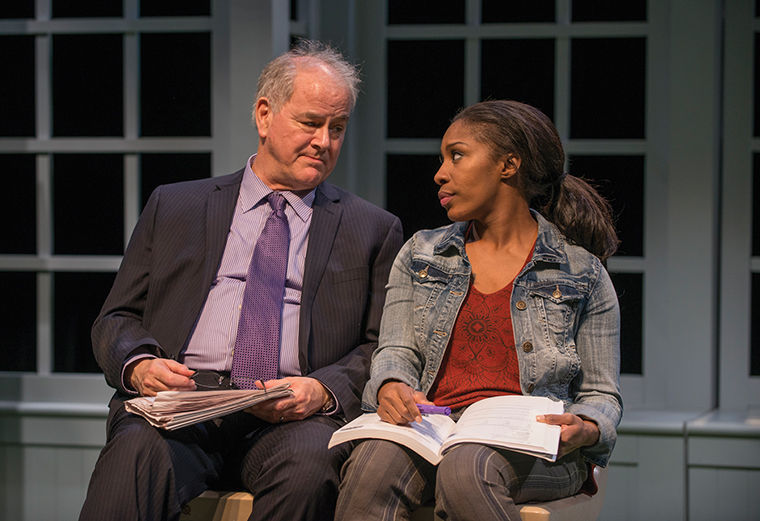‘White Guy On the Bus’ drives racial issues home
Photo Courtesy MICHAEL BROSILOW
Francis Guinan and Patrese McClain, star in Bruce Graham’s racially charged play, “White Guy On the Bus,” at the Northlight Theatre, 9501 Skokie Blvd., in Skokie, Illinois.
February 16, 2015
Bruce Graham’s play “White Guy On the Bus,” made its world premiere on Jan. 23 at the Northlight Theatre in Skokie, Illinois, 9501 Skokie Blvd., and has shocked audiences with its portrayal of race, but not in the way one might expect.
“White Guy On the Bus” tells the story of an upper-middle class, white businessman in Philadelphia who rides the same bus as a single black mother every day. As the two `get acquainted, the play unravels the perceptions, stereotypes and prejudices that go hand-in-hand with race in America. According to Graham, inspiration for the play came from two separate articles about buses—one about a prison in western Pennsylvania without access to bus service, which prohibits poor family members without cars from visiting relatives, and the other telling the story of a bus to Riker’s Island in New York with only one white male passenger from day to day.
Graham said he took inspiration from both of the articles and paired it with his own experiences of living and commuting in Philadelphia, which developed into something more than just a story about a man on a bus. He said the story became about the things he heard while riding the bus himself.
“I take the bus a lot, so I’m always eavesdropping,” Graham said. “People always say, ‘We want an honest discussion [about race],’ and my feeling is no we don’t. Neither side wants an honest discussion, that’s why [some] people listen to conservative radio and [others] listen to liberal radio. They want to have their opinions stroked.”
BJ Jones, the artistic director at the Northlight Theatre and director of “White Guy On the Bus,” said audiences who come to see the show are typically surprised to learn that the conversation about race that takes place within the play addresses racism against the black population and whether it is perceived or actual racism.
“It’s some of the sentiments expressed by the white characters in the play, which I think challenges our audience,” Jones said. “What the play ultimately reveals is that we are all—whether we want to admit it or not or even realize it—racist, and that’s a very difficult conclusion to come to.”
Jones said viewers may leave the theater and say, “Oh my god, it’s so sad. What are we going to do?” The play is intentionally hard for the audience to swallow and encourages them to take ownership of their prejudices and find a way to overcome them.
“No one wanted to touch this play,” Jones said. “They were all afraid of it and we stepped up and did it. It is not a flattering picture of the American dream, but again, if we don’t admit to ourselves our part in the problem, then there is no way that we are going to take steps forward to solve the problem.”
E. Patrick Johnson, a professor of performance and African-American studies at Northwestern University, took a group of students, faculty and staff to see the play as part of the “Black Arts in the City” arts program. Johnson said he and his group did not leave the theater with positive views of the play.
“My students did not like the play,” Johnson said. “They weren’t ambivalent at all. I was more ambivalent because I understood what the playwright was trying to do but did not succeed in doing.”
Johnson said his mixed feelings were due to the sensational twists and turns that occur within the play’s plot and not for the message that is being conveyed.
“It could have been an interesting way to engage race relations, but instead it turned into this sensationalist story that kind of undermined what the playwright was really trying to do,” Johnson said. “I get that it’s about white people and white liberals, I just don’t think [the script’s] very smart about it. Every scene that we see [is] this white family. They are talking about race … that is a misreading of how white privilege works. White privilege works so that you don’t have to think about race.”
Graham said he wrote “White Guy On the Bus” this way because he wanted to produce a piece that would get people’s attention.
“The theater really annoys me because [it] is so politically correct,” Graham said. “I’m always going out of my way to yank people’s chains. My last play, ‘Stella and Lou,’ was very sweet, light and lovely and nobody got murdered. I wanted to do something different.”








